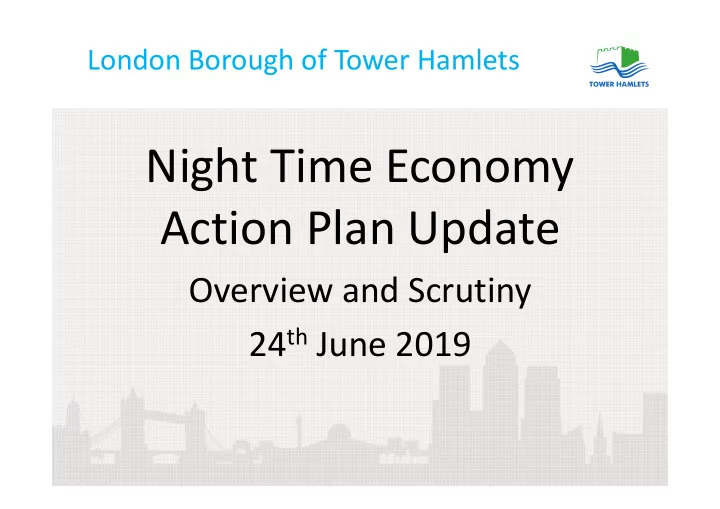

London Borough of Tower Hamlets Night Time Economy Action Plan Update Overview and Scrutiny 24 th June 2019
Background • A prosperous Night Time Economy (NTE) can be a great asset and generate growth, but can also generate ASB, crime and environmental pollution. • Review (September 2017) looked at how we can support growth but mitigate damaging effects. • 11 recommendations were identified (Appendix 1).
Vision • Member and Officer NTE champions are in place. • Development of a 5-10 year approach will commence (based on the GLA’s Night Time Commission). • Approach will broaden the current offer to include early evening/family entertainment (and avoid further escalating ASB).
Protection of NTE through Planning Policy • The draft new Local Plan will support/ protect existing community facilities (incl. public houses). • Annual monitoring will review the plan’s impact on community facilities/loss of public houses.
Growing the NTE • Approx. 600 clients registered to training courses which support the NTE. • Large recruitment carried out for TfL and Travel Lodge. • Several events run to engage with local business supporting the NTE to identify support needs. • Business Summit (June 2019) will further engage businesses to determine their needs.
Licensing • The council’s Licensing Policy was evaluated in 2018. • Cumulative Impact Policy (introduced in Bethnal Green, and continues in Brick Lane). • Members scrutinise applications at Licensing Sub-committee and are making robust decisions.
Late Night Levy • The Late Night Levy is in place. • Projects allocated funds via Community Safety Partnership include: – Additional police patrols, – Street Pastors, – Additional street washing, – Extra waste bins – big belly bins, – Comms /posters to ‘go before you go’, – WC’s for installation in Brick Lane.
The Customer Journey • Council website updated to simplify how customers can raise complaints and review progress on licensing applications. • Planning Compliance Policy adopted clarifying how residents can report breaches, it also sets out the process for enforcement. • Council website updated clarifying legal position on short term lets and how to report issues relating to Air BnB (e.g. noise, nuisance and other anti-social behaviour).
Intelligence based action • Town Centre partners/data informing NTE projects (e.g Pub watches in Whitechapel, Brick lane & Commercial Street) and campaigns to reduce ASB. • Intelligence (LAS & NHS ) used to target incidence of drug related activity through public realm design (Whitechapel). • Complaints data (licensed premises/noise) is informing the tasking of police officers and street pastors. • Food hygiene rating score used to raise standards (Best Bar None Awards).
Enforcement • The pilot Neighbourhood Management Pathfinder is operational and targets ASB issues in priority areas. (Spitalfields and Banglatown, Weavers, Bethnal Green and St Peters) • 12 police officers are in post with a further 13 awaiting release by the BCU Commander. • Additional resource put into Community Safety to ensure effective coordination across council and partners.
CCTV • £3million CCTV capital investment has been provisionally agreed as part of the 2019/2020 budget. • Currently updating our approach to CCTV usage to ensure it is used effectively. • Recommendations include; – Enhance use of CCTV in dealing with envio-crime (fly tipping/noise nuisance). – Consider use of re-deployable cameras to respond to ASB (including temporary events). – Expand network of HD, UHD and 4K cameras (improved quality vital for impact on Night Time ASB)
Appendix 1 - NTE Review Recommendations 1. The Council develops a vision for the coming five to ten years for the Night Time Economy in the Borough 2. The Council appoints a “Night Czar” for the Borough who is a champion for a balanced Night Time Economy, a voice for all and not just businesses and their customers. 3. The Council urgently reviews its Cumulative Impact Zone as the policy has failed to control the growth of licensed premises 4. The Council ensures that if a Late Night Levy is introduced, funds raised by the Levy fund additional activity, clarity is gained about what the 70% of funding allocated to the Police will be used for and explores the Soho model of using the Late Night Levy as a way of bringing businesses and residents together 5. The Council maps the “customer journey” for local residents through the licensing and enforcement process, with the aim of creating a clear guide for local people on who to contact and when if they are being affected by the NTE, accompanied by service improvement 6. The Council reviews its staffing approach for enforcement officers for issues such as noise nuisance and anti- social behaviour (ASB) to ensure that officers are available at times of high demand such as late night at weekends 7. The Council ensures that its skills and employment support provides local residents and young people with the assistance they need to take advantage of opportunities for employment in night time economy employers. 8. The Council reviews its Assets of Community Value process, and ensures that provisions in the Local Plan are robustly and consistently applied to save pubs and clubs as community assets 9. The Council explores licensing and enforcement options for new, “sharing economy” entrants to the NTE in the Borough such as AirBnB 10. The Council reviews its approach to ensuring adequate public toilet facilities for those using the NTE and travelling between venues to reduce the impact of public fouling on residents local to NTE zones. 11. The Council conducts a comprehensive impact assessment of the impact of the Night Time Economy on residents, services and businesses.
Recommend
More recommend